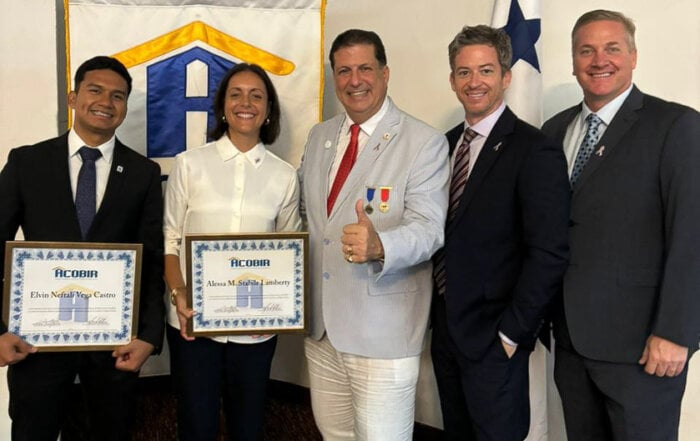
Web3 and Real Estate Summit | Miami Beach, FL 2022
The real estate industry is undergoing a major shift. With the advent of Web3 technologies, it’s now possible to tokenize real estate holdings and make them tradable in a digital currency marketplace.
We’re really excited about this new technology and want to be at the forefront. So, on October 27, 2022, Panama Sovereign Realty flew to Miami Beach, Florida to attend the Web3 and Real Estate Summit. This event, sponsored by Propy, brought together real estate and financial professionals, investors, technologists, and crypto/NFT/metaverse enthusiasts to share ideas about new Web3-based technologies that are poised to change the way we consume and share information online and the way we think about property ownership forever.
So, what is Web3 (as opposed to Web 3.0) exactly, and why should we care? And what about Web 1.0 and Web 2.0? Let’s take a quick look at each before jumping headfirst into the Web3 vision that could shape the future of the internet.
Web 1.0, 2.0, 3.0, and Web3
Web 1.0
Web 1.0 is the first generation of the World Wide Web and was born out of a need to share information. It debuted in 1990, when Tim Berners-Lee introduced HTML and HTTP as the foundation for all websites. This first iteration of the web was text-based and used hyperlinks to connect pages and files, making it easy to navigate through large amounts of information.
Web 2.0
The development of Web 2.0 came with many changes and advancements, including; Ajax, (which allows users to interact with content without refreshing the page), RSS feeds, social media integration, video-sharing sites like YouTube, blogging platforms like Tumblr and WordPress, photo editing tools like Photoshop, commenting systems like Disqus, “wikis” like Wikipedia, etcetera.
Web 3.0
The next generation of the World Wide Web is called Web 3.0 or “the Semantic Web.” This is where things get really interesting! The semantic web will allow us to search for answers using natural language queries instead of keywords—so if you want to know how many calories are in a banana (and why does this matter?), you can just ask your computer that question without having to type anything at all!
Apple’s Siri is a great example of a Web 3.0 application. Web 3.0 could be as disruptive and represent as big a paradigm shift as Web 1.0 and 2.0 were.
It’s important to remember that Web 3.0 and Web3 are not the same (but they are similar). Web 3.0 uses “data interchange technology like RDF and SPARQL”, whereas Web3 is built upon the blockchain. Web3 can be thought of almost as an evolution of Web 3.0: a vision for a better internet built upon the core concepts of decentralization, openness, and greater user utility.
Web3
Leeway Hertz describes Web3 as “a platform that uses blockchains, cryptocurrency, and NFTs to return power to users in the form of ownership. Web3 is not concerned with creating a similar web of hyperlinked resources but rather solving issues around asset ownership, both digital and physical”.
Web3 is a blockchain-based protocol that uses the idea of an internet that is decentralized. The goal is to allow people to interact without the need for any central entity to maintain the network. The idea behind Web3 is that it will enable people to collaborate and create value without having to rely on third parties or other intermediaries. In this way, it has been compared with peer-to-peer networks like Napster and BitTorrent, which both allowed users to share files with one another without having to go through an intermediary like Apple or Google (for example).
One of the main benefits of blockchain technology is its ability to record transactions in an immutable manner—that is, in such a way that no one can alter them later on. This makes blockchains ideal for storing information about cryptocurrency transactions or other kinds of financial transactions because they are not subject to tampering from anyone else (including governments).
Web3 and Real Estate
Cryptocurrencies are revolutionizing the way we think about money, and Web3 is a blockchain-based platform that utilizes smart contracts that allow users to invest and buy and sell assets like real estate with cryptocurrency.
Tokenization
We’re not just talking about buying and selling property online- we’re also talking about “tokenization”, which allows individuals or companies to own a share of a property. Tokenization has been a major part of the blockchain game for some time now. In fact, it’s one of the reasons investors find bitcoin to be such an interesting investment opportunity—because it’s not just a currency, but also an asset. And now that same technology is being applied to real estate so that investors can buy shares in properties rather than having to buy the entire thing outright.
Tokenization also allows investors to get involved with projects that are too small or too risky for them on their own. This is especially useful for investors looking for new ways to diversify their portfolios. The digital currency revolution has arrived, and it’s already changing the way real estate is bought and sold.
NFTs
NFTs are a new way to trade real estate. NFT stands for “non-fungible token”: a digital asset that is unique and can’t be replicated.
The idea behind NFTs is that the blockchain makes it possible to create digital tokens that are unique and can’t be replicated—and then use those tokens as representations of real-world assets like properties.
These tokens are used to represent a specific property, such as an apartment or house, and they can be traded just like any other cryptocurrency.
The Metaverse
The real estate metaverse is a 3D virtual reality platform that allows brokers, developers, and agents to present their listings in a three-dimensional environment.
The idea behind this technology is to make it easier to visualize properties and give potential buyers a better idea of what they might look like in their own homes. The goal is to facilitate more informed decisions about buying property.
The real estate metaverse has been around for some time now, but using it has become more common among agents and developers over the past few years. This is because it offers a way for people who are selling their homes or looking for new homes to be able to see what the property looks like without needing to actually go out there and visit the place themselves.
We’re already doing virtual tours, zoom calls, etc, but the metaverse is taking things to a whole new level, including:
-Creating a virtual tour of your house before putting it up for sale so potential buyers can see what it looks like from any angle;
-Having meetings with clients or coworkers from around the world in real-time;
-Having virtual meetings with clients who don’t want to travel but who want to meet with you “in person”;
-Creating a virtual space where potential buyers can look at houses before going out on tours in person;
A Decentralized Real Estate Marketplace Platform
Propy
For over a decade now, we’ve seen an explosion of innovation in the world of blockchain technology. This new technology has been used to create new kinds of applications that can be used for almost any purpose. And Propy is one of the leading companies using it to revolutionize the real estate industry.
Propy is a California-based blockchain technology company that has created a platform that facilitate transactions in the real estate market using crypto tokens on the Ethereum blockchain. The platform also allows users to tokenize their properties by creating digital versions of them that live on the blockchain as well as fractionalized ownership agreements through smart contracts. This means that if someone wants to sell their home but doesn’t want a traditional mortgage, they could tokenize it and sell shares in pieces rather than selling off all rights at once (like with traditional mortgages).
The mission of Propy is to make it possible for people all over the world to have access to safe, fast, and affordable real estate transactions by utilizing blockchain technology. With platforms such as Propy, you can use cryptocurrency to purchase real estate and even pay off your mortgage, all at the click of a button.
The company has already made several important partnerships with other companies in the industry, such as Agrello (a smart contract platform), Deeds Incorporated (a real estate tech company), and RealtyShares (an online investment platform).
What’s next?
The future is here. Web3 already has real-world real estate use cases and practical applications: property ownership through NFTs, property management via blockchain, loan and mortgage securitization, land and property registries, investor and tenant identity verification, tokenization of real estate properties, and virtual and metaverse real estate.
You may be asking yourself, “When can we expect to see Web3 and blockchain technology in Panama, if ever?” The answer is, it’s already here. That’s right. As you read this sentence, properties in Panama are being bought and sold using cryptocurrency (i.e., blockchain technology). The Panamanian legislature also approved a bill this past April regulating the use of cryptocurrencies in the country. Although the bill was partially vetoed by President Laurantino Cortizo, he’s in favor of the measure overall. He’s instructed the legislature to make the bill adhere more strictly to the requirements set forth by the Financial Action Task Force (FATF) before he signs it into law.
We came away from the Web3 and Real Estate Summit feeling like a lot of this technology is going to become more mainstream in real estate and other industries. At the end of the day, for us it’s about helping our clients. That means real-world applications and better solutions for both buyers and sellers. Better marketing tools, more ways to offer value, and more options to transact can only be a good thing. To be sure, the Web3 and Real Estate Summit was an amazing experience and one that Panama Sovereign Realty plans to attend again in the future if given the opportunity. Who knows, maybe we’ll be presenting one day.
What are your thoughts on Web3 and blockchain technology, cryptocurrencies, tokenization, NFTs, and the metaverse? Drop us a line and let us know what you think.










